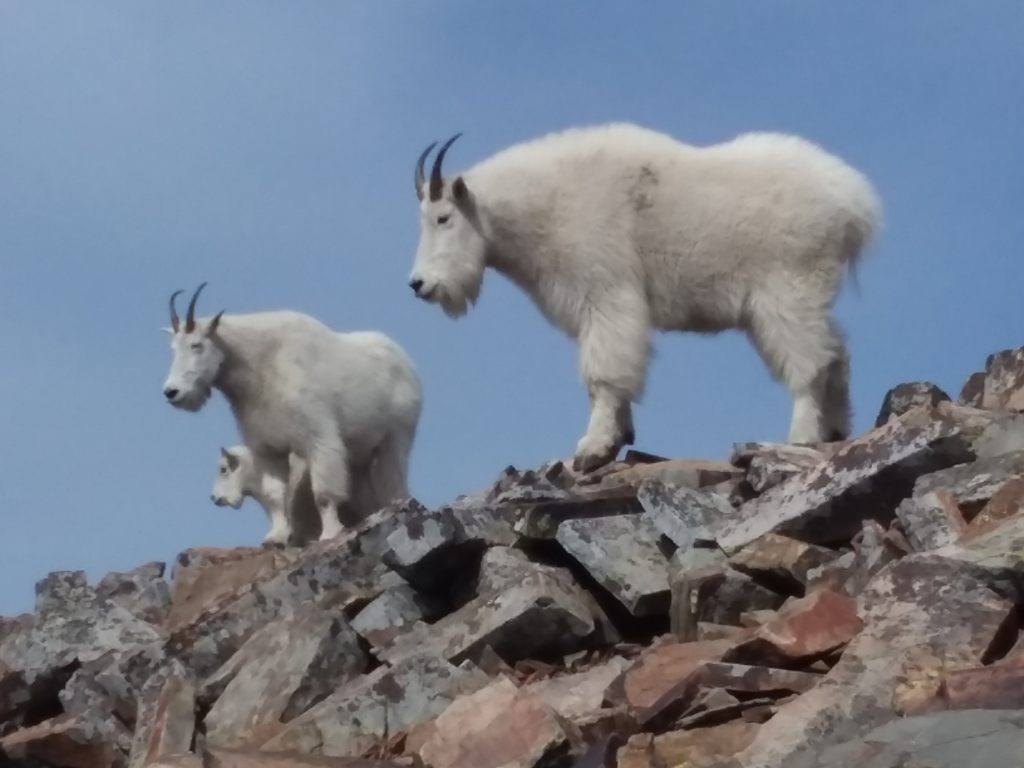Angels and Demons, Glacier style. There shall be blood.
Original date 7/18/23
Now, the Angel Wing is a mountain on the slopes of a taller mountain (namely, Mt Gould). You should all be familiar with this if you have dug into any of my prior posts on hiking in GNP. The problem: it is considered to be a lowly objective. Although almost 3800 feet of gain from the Many Glacier Hotel, but most of it is on the trail going up to the Grinnell Glacier. There are only about 1000 feet of what most GNP veterans would consider ‘fun.’ Would enduring the literal thousand of hiking tourist (I counted them once) I would be forced to pass on the trail be worth it?s
For those who don’t want to read 2000 words of wit, skip to the 3-D Strava video at the end. I won’t be offended (too much).

But I have always wanted to get to the top of ‘the Wing.’ I just had a feeling that even at only 7300, it would have the best views of all the wonderful geographic features tucked back deep in the Many Glacier Valley. I’m glad to say I was right, and it was worth burning a hiking day. And what a glorious weather day it was! Despite the parking lot being almost full by 6 am.

There would be some fun scrambles up the cliffs on the back side of Grinnell Point when I run out of other peaks to climb. Or I don’t have a double-digit day in my knees anymore. I have a feeling both of those things might come true at the same time. Of course, by then, I’ll have Alzheimer’s and be wondering why I can’t play the piano.

You can see why Mt Gould has always been one of my favorites in the Park. Not just on the spine of the Continental Divide, it also showcases those beautiful layers of rocks laid down in an ancient inland seabed millions of years ago. And the Angel Wing? It’s that nice little bump in the foreground to the right. Sure, it doesn’t look like much. But you have to be patient.

I make quick work of the trail. I was passing hikers who must have started in the dark because they were a few miles in. I’ve always wondered if Grinnell Mt could be climbed from this side. I took a route down from there in the early 1990’s. All I can remember, it was a lot steeper than I was comfortable with. And that was back when I was young and had no fear.

Looking up at Angel Wing from this perspective makes it look at least a little more daunting than it is. I feel bad about turning a half-day hike into a 14-mile, 9-hour excursion. But I’m here to enjoy myself this summer. It can’t always be about ticking off the big miles and the elevation gains (Patrick).

Grinnell Lake is that wonderful color of turquoise blue. This lake is in almost every publication from Glacier Park. It is just so iconic. The funny thing is that it only looks this spectacular when you are at least a thousand feet above it. It’s muddy, buggy, icky, and sticky from the shoreline. And the colors don’t pop when you see them at eye level.

The heat came on early. Summer was three weeks ahead of last season. The wildflowers bloomed and burned in record time. These alpine meadows should be alive with color.

Steadily climbing up to the headwall where the remains of the glacier quietly melt, I can see back down the long valley on what will be a scorching day. But that’s why I was on the trail by six. Usually, starting that early, you have to be on the lookout for bears. But ample bear bait was on the trail in front of me through the forest, so I felt just fine.

This is where I leave the tourists behind. I walk across a ridge of rock scoured by many untold glacial events over the last 100,000 years. I need to cross the melt streams from the glacier’s outlet, make my way to the saddle between the Wing and Gould, and then bear to the left—piece of cake.

The park comes alive when you can reach down and scratch your fingernails through the ancient gouges created by a half mile of vertical ice grinding across the surface.

After hiking and climbing in the Park for almost 40 years, I discovered something I had NEVER seen—pools of red meltwater. I’ve seen the red algae that form on the snow and ice fields. I guess I just figured that stuff died and was washed away when (and if) the melt came that season. But I never imagined I would find just stagnant pools of red, framed perfectly by the mountain, glaciers, and azure sky. I don’t know if this was one in a million thing, or if it happens every year.

I finally bottom out at the end of the valley. Mt Gould and Grinnell Glacier (lower). High above are glacier remains that have been demoted to a semi-permanent snowfield.

This is how I turned a half day into a full day. I need to cross the glacier’s many braided outlet streams. Without getting my boots wet. This is still considered early in the season. Easier said than done.

The tourists are away from me at the far end of the melt pond. It seems that after the strenuous hike, none want to explore this incredible glacier-carved headwall. It was their loss. With a little more effort, they could be in a place where it is impossible to take a bad picture.

I wish you could have heard the rush of this water. It was deafening. And there was nowhere to cross where I would not have been at high risk of being swept away.

I found little paths of rocks across various streams that would be safe to skip over when the water flow was down, like in late August.

I did this for over an hour. I could either turn back and try another day or start thinking about removing my boots. If I could find a narrow spot to wade across this maze, that would be too deep or swift.

From way up high, tiny Gem Glacier looks down on me. And counts how many years it has left to cling to the side of that wall.

More blood ponds as I started calling them. It must have been a couple dozen in various nooks and crannies. I think this is not that common of a thing, or I would have surely seen people blog/post this out there in the digital world somewhere. Or do I need to look?

I found the NPS station where they measure the glacier’s water flow. I hope to find near it a place to cross to the other side. I need to get to that saddle that keeps mocking me.

Finally, I see it. The gaps and depth of the water are much broader and deeper than they look in the photo, but I can make it across. If I had played video games as a kid, the solution to the maze would have come to me quickly. And I didn’t even have to take off my boot!

I leave the last of the water behind. It’s time now to start focusing on the objective for the day.

With dry feet and many hours left before sunset, it’s time to find out what the world looks like from the top of the Angel Wing. Its former name was Mt Monroe, for an early scout/fur trapper in the area that George Grinnell hired a lot. But like most of our National Parks at the turn of the century, people thought a more Western spiritual name was needed. Of course, returning to what the Blackfeet had called it centuries ago would be silly.

If I have time, I’m thinking of checking out this little hump in front of Gould. There may be a route up that ridge. Almost. But I might know someone willing to find out (Patrick).

Sadly, most people don’t get this upfront and personal with Grinnell Glacier. Although glaciers are fading fast in the Park, you can still find good ones if you look hard and hike deep enough.

The best views I have ever had of the Grinnell Glacier complex are, without a doubt, from the summit of the Angel Wing, almost beyond words. I need to remember my way back through that maze of water!

From here, I can look down on the endless chain of lakes that always form in the glacial valley of GNP, from Grinnell to Josephine, to Swiftcurrent, to the Sherburne reservoir, and the plains beyond.

If I look closely enough, I can trace the trail coming up from the Many Glacier Hotel trailhead. Yep. There is a lot of gain and a lot of open sun. So many tourists start this mid-morning with families. I saw a LOT of them melting down along the trail. Ten miles round with 1500 of gain is a real hike, not to be taken lightly. And when I see a father carrying a six-year-old in his arms the last mile, I can only nod and smile. Know your limitations!

The only way to properly view Grinnell Lake is from the top of Angel Wing.

The three glaciers of the valley are all in one view: Gem, Grinnell, and Salamander in the middle of the wall.

The wind was picking up, so I had to be careful with my balance. Yes, it is a very long fall.

Incredible day with incredible views. And I only saw one other person who was trying like me to cross the streams at the melt lake. But they never did. No one is up here to spoil my day.


I take a walk down to what I call the ‘lower’ Angle Wing. The views were good, and there was quite a bit less wind, which can be a friend and a foe on any day of high elevations.

Mt Allen, Mt. Siyeh, Goat Mtn, Going to the Sun Mtn, Cataract Mtn, Piegan Mtn, and just the shoulder of Pollock Yep. I’ve been on top of all of them at least once.

Finally, I got my wildflower fix. It’s hard to believe they are fading so fast this season.

I could have explored these tiny shelves, melt streams, and ponds for hours. It’s hard to think just to the far right; a hundred tourists are making fools of themselves at the lake’s end. It is like they aren’t even there.

One of the best pictures of the day. The Angel Wing with a shaft of sunlight crossing the face. Gould and the backside of the Garden Wall off to the right. Cataract and Piegan mountains off the left. Even with the low elevation, it’s a great day to be alive and climbing. 😊

At the end of the day, I was glad for every step. What an incredible little hump this is. Tucked way back in what I can only call a magical valley. When George Grinnell explored here in 1885, he came up this valley for the first time. This environment, this ecosystem, planted in his mind the dream of Glacier National Park. It would take another 25 years, but I’m glad he stuck to it. Most would agree.

GoatBoy out!











 Total views : 1522821
Total views : 1522821
















1 Response
[…] You get genuinely incredible views of the Grinnell Glacier complex and the Garden Wall from the true summit. It’s hard to believe that dead center is the Angel Wing. […]